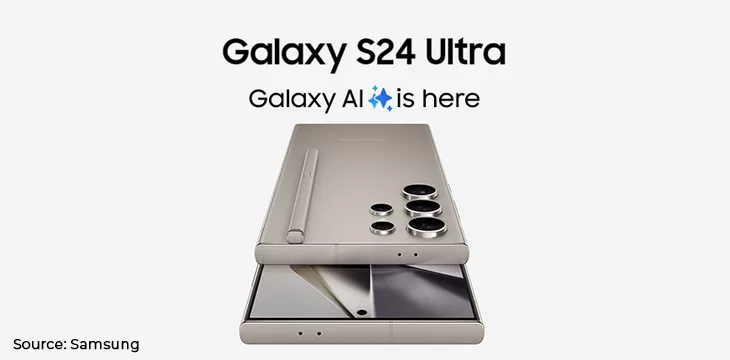|
Getting your Trinity Audio player ready...
|
The tech industry has seen a significant shift towards integrating artificial intelligence (AI) in consumer devices. As 2023 came to a close, we began to hear about “AI PCs,” as well as “AI Chips,” and now, the “AI Phone.”
Samsung (NASDAQ: SSNLF) recently unveiled its line of AI phones, the Samsung Galaxy S24 series; each device will have enhanced messaging, photography, and gaming capabilities, thanks to the Qualcomm Snapdragon 8 Gen 3 processor, designed to deliver AI functionalities, that powers it.
The AI feature boom
Samsung announced this new line of phones at its Unpacked Event. During the event, it demoed several of the new AI features that the Galaxy series is going to have, such as:
- Live translate speech: The phone can translate real-time conversation seamlessly, making it possible for bilingual conversations to take place.
- Live text translation: The phone can do real-time text translation in 13 languages as users type.
- Circle to search: A long hold on the home button starts a feature that allows users to then circle items on their screen that the phone knows to immediately Google Search.
- AI photo editing: Generative AI is used to enhance and edit photos easily.
- Samsung note assist: Samsung is integrating AI into its note-taking app to allow users to create and add structure to their notes quickly and efficiently.
- Android Auto: Android Auto pairs with vehicles to offer AI-powered suggested replies and summaries of messages through voice commands so that individuals have a hands-free way to respond to messages while driving.
There is value in these new additions to the Samsung phones, but they are also reflective of a broader trend that we are seeing in the tech industry: a surge in ‘AI branding,’ where AI becomes more of a marketing buzzword than a necessity to deliver the unique value proposition. It shouldn’t be just about having AI; it should be about how AI enhances the user experience.
Samsung has taken a step in the right direction by adding AI capabilities into common workflows, such as allowing users to learn more about an item they see on their screen by circling the item, using generative AI to edit and enhance photos, the various translation functions the phone will have, as well as its AI-assisted automotive pairing. But even those features are “nice to have” and not the necessities consumers look for in a phone.
However, it is not only Samsung; the proliferation of ‘AI Devices’ is part of a larger trend that the world is experiencing. From PC manufacturers like Microsoft (NASDAQ: MSFT) integrating generative AI into their computer’s chips—and even adding an entirely new button to their keyboard for the first time in 30 years solely dedicated to an AI assistant—to automakers like Mercedes and Volkswagen incorporating ChatGPT in their vehicles, AI remains a “must-use” technology by corporates.
To stay competitive, companies must keep up with the latest trends in technology, which, at the moment, are dominated by AI, particularly generative AI and Large Language Models (LLMs). That being said, most of these companies have little to gain by adding AI to their devices, but they do have a lot to lose if they do not keep up with their competitors and offer similar products and features.
Understanding consumer AI trends
We are approaching a point where consumer-facing generative AI products have been in the market for two years, meaning there is enough data out in the wild for companies to analyze how, why, and when consumers use AI.
Several trends have recently emerged in the consumer-AI segment of the market, such as people using AI as an advanced and more direct search engine, people using AI to generate or enhance text, visual, and audio content, and people using AI in the workplace to automate mundane tasks and augment complex work.
Whether it was through research or luck, Samsung has capitalized on a few of the areas in which consumers are showing demand for AI, but other technology manufacturers would benefit from studying consumer demand before slapping “AI” onto their products because we will soon enter an era where branding products with “AI” will not be enough. For users, especially those with devices that already meet their needs, companies need to offer AI features substantially better than the existing tech devices most people have to justify the transition to a new ‘AI device.’
Regardless, the surge in AI-integrated consumer devices shows no signs of slowing down. But for this trend to have staying power, devices will need to go beyond merely including AI and will need to move into a space where they are using AI to genuinely enhance user experiences. For that to occur, companies will need to go beyond using AI as a marketing gimmick and instead focus on developing AI features that cater to real consumer needs.
In order for artificial intelligence (AI) to work right within the law and thrive in the face of growing challenges, it needs to integrate an enterprise blockchain system that ensures data input quality and ownership—allowing it to keep data safe while also guaranteeing the immutability of data. Check out CoinGeek’s coverage on this emerging tech to learn more why Enterprise blockchain will be the backbone of AI.
Watch: Artificial intelligence needs blockchain
Recommended for you
British lawmakers of the parliamentary national security committee have called for a temporary ban on political parties receiving donations in
Circle (NASDAQ: CRCL) soared in 2025 thanks to U.S. ‘regulatory clarity,’ but can this momentum survive a ban on crypto

 02-27-2026
02-27-2026 




